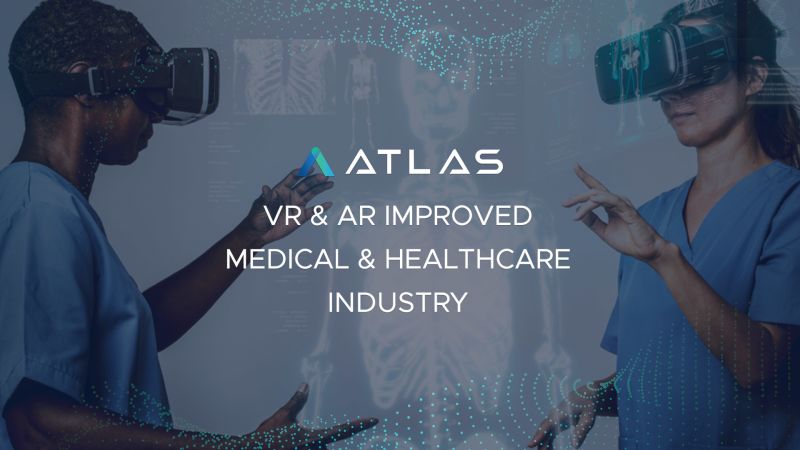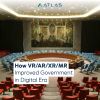Immersive technology is becoming more widely accepted, and the healthcare sector is among the first that utilized it impressively well. In the healthcare sector, AR and VR will reach US$5 billion, rising at a rate of 36.6% compound annual average, according to research by Reportbuyer.
The doors to new prospects in the healthcare sector have now been opened wide with the introduction of AR and VR technologies like ATLAS Reality. These immersive visual technologies, often known as Extended Reality (XR) technology, blend real and virtual surroundings.
While AR is used to improve contextual meaning, VR works better when the viewer is completely immersed in a virtual world. Here are a few ways that AR/VR/XR technology will influence the healthcare sector in the not too distant future.
Benefits of AR, VR and XR in Medical and Healthcare
Here’s some benefits of using virtual reality technology in medical and healthcare.
3D Visualization
AR and VR may assist doctors study human physiology and anatomy. While conventional training involves static two-dimensional graphics that a medical student must complete mentally, XR helps them study some more by immersing them in every aspect.
Develop skills
Medical training also includes physical work like inserting catheters, taking blood, and conducting procedures. AR and VR technologies allow students to acquire skills and behaviors in a virtual or mixed reality environment by executing the program. Practicing these abilities in an immersive setting makes medical students increase their accuracy and precision.
Expertise
Medical practitioners may study new techniques and pharmaceutical innovations in an immersive setting, which helps them retain more knowledge.
The continual evolution of medicine is a challenge for today's healthcare workers. To avoid falling behind, students must learn and assimilate new knowledge. AR and VR allow them to do so efficiently and immersively.
Patient education
XR technology, particularly AR, may be utilized to educate patients during consultations. This will help medical workers instill confidence and trust in their patients, allowing them to make better judgments. When patients understand their disease and therapy, they're more responsive to self-care.
Virtual healthcare
AR-based navigation may help patients quickly discover what they need. It may also assist nurses and other medical workers discover equipment in crises.
Virtual aid with AR may also improve hospital and medical clinic orientations so audiences comprehend topics properly and retain more knowledge.
VR pain-management
VR may divert pain or discomfort. For instance, it can be a terrific way to assist people in early labor to relax and breathe. VR technology delivers various therapeutic tools and approaches that may help burn sufferers, women in labor, and other patients through a difficult recovery.
Digital hospitals
People don't like hospitals. The ambiguity may be annoying and distressing. Moreover, children might find hospitals frightening.
In medical institutions, VR and AR may be utilized to amuse patients with games for kids, VR tales, and orientations for adults. These technologies may help spread educational material, such as the importance of immunizations.
AR medical marketing
XR technologies are still in their infancy in the healthcare business. Medical practitioners are researching methods to use VR and AR in marketing and promotion.
Pharmaceutical businesses market drugs through mobile applications. These applications employ flow animations to explain how a formula works within the human body.
The technique is also used to explain items to physicians using hovering animations, which are more engaging than PowerPoint slides.
Real Application of Virtual Reality Tech in Healthcare
While some are still questioning the usage of VR, bigger brands have already utilized the tech perfectly well. Take a look at these examples!
1. Locating vein with VR by AccuVein
The pioneer in vein visualization, AccuVein, provides a straightforward illustration. They create a map of the patient's veins on the skin's surface to make it easier for medical personnel to locate veins. Evidence demonstrates that vein visual representation dramatically improves clinicians' capacity to locate these challenging veins on first endeavor. The innovation is primarily used to help health professionals find veins that otherwise couldn't be seen or felt.
2. Improving vaccination experience with VR Vaccine
VR can also help with vaccination. A project called VR Vaccine reduces the children's fear of being vaccinated. The tech allowed children to watch an animated adventure narrative using a VR headset as part of the VR Vaccine experiment. This allowed a nurse to deliver an injection and clean the patient's skin while the story was being played out on a separate screen.
The VR technique was developed to effectively block out and deflect from the needle since the team's study revealed that most kids were more afraid of the needle itself than they were of the potential discomfort it would cause. Because of the project's success, the Brazilian drugstore chain Hermes Pardini has subsequently put VR headsets at each of its locations to support its vaccination programs.
3. Reducing regional anesthesia discomfort in St George's Hospital
Not just youngsters use VR. VR helps older patients undergoing regional anesthesia to be calm and comfortable throughout surgery. St George's Hospital in London gave patients receiving regional anesthesia the option of utilizing a VR headset during and before their surgery.
100% of subjects indicated using the headset enhanced their hospital experience, 94% felt more calm, and 80% felt less discomfort. Patients reported being so absorbed they didn't realize they were in the surgery room.
Book a G-Meet demo here: https://atlasvirtual.id/#contact
To learn more about the ATLAS REALITY virtual tour solution, please contact CS at vanesa@atlasreality.co.id





